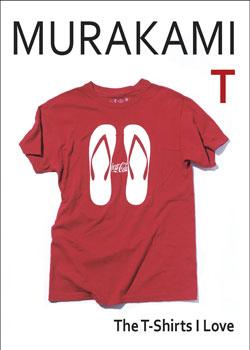Murakami T: The T-Shirts I Love

By Murakami Haruki
Translated by Philip Gabriel
Harvill Secker (2021)
ISBN-13: 978-1787303195
Review by Laurence Green
What is it that compels us to collect? A means by which to assert order and structure within a chaotic, messy world? An unerring impetus toward that forever unattainable promise of the 'complete' collection? Or perhaps it is just plain old desire, born out through all the power and force of modern day consumerism.
And so, to the latest Murakami Haruki book. But wait… it’s not a novel, or even one of his always-popular short story collections. No, Murakami T: The T-Shirts I Love is something else entirely, an ode to that most humble item of clothing, as the author takes us through a selection of some of the favourites from his own personal wardrobe. The volume's handsome dust jacket tells us that the T-shirts photographed and discussed here are in many ways just an extension to some of Murakami's other obsessions, including his well-documented passion for running (which he famously wrote about in What I Talk About When I Talk About Running) and, of course, his collection of 10,000 vinyl records. And yet, as Murakami explains in the book’s opening essay, he isn't especially interested in collecting things, they just seem to accumulate. Like a kind of antithesis to KonMari and her decluttering regime, Murakami sees objects pile up, gathering around him, even if they don't serve any obvious purpose. He is, he claims, resigned to it.
Portions of this book originally appeared in the ultra-hip Japanese men’s fashion magazine Popeye between August 2018 and January 2020. Fitting, given Murakami himself was a reader of Popeye back when it launched in the 1970s, and he would regularly purchase the magazine for customers to leaf through as they frequented the jazz bar he was running at the time. The 1970s were also when Murakami recalls illustrated T-shirts first starting to appear in Japan, with a particular predilection at the time for those bearing the branding of American Ivy League universities. We discover that most of Murakami's T-shirts come from the thrift store Goodwill in Hawaii, and that after the publication of the original articles in Popeye magazine, the prices rose - coincidence, or not?
Often, the T-shirts are merely a springboard to talk about something else entirely. There is an amazing chapter where Murakami expounds several paragraphs on the virtues of picking up a cheese hamburger (onions, tomatoes, lettuce, pickles, plus a side of French fries and coleslaw) in the USA and enjoying it alongside a Coors Light. This is the kind of writing that Murakami's fans lap up with voracious appetite; a pulpy, fast-food love affair with the minutiae of life’s little pleasures. For Murakami, it is a means of 'imbibing the atmosphere', a symbolic arrival in 'America' far more meaningful than the plane actually touching down on the tarmac. He then follows this up with an equally wonderful piece singing the joys of good whisky. Many of Murakami’s novels have attracted fan-made playlists compiling the many records he mentions in them - perhaps this book could do with something similar in the form of tasting notes?
As always, it's Murakami's mixture of casual friendliness paired with a kind of sagely wisdom that charms in the extreme. His eye for the bizarre, or just downright random. Did you know, for example, that 'If you wear a T-shirt with an animal design, the chances are very good that a girl or woman will tell you, "Whoa - that's so cute!"' - In Murakami's novels, chance encounters and happenstance like this are the stuff that a whole novel's worth of action springs forth from, but even here, these bitesize essays give off the buzz of the everyday banal turned life-affirming wonder. Philip Gabriel - serving on translation duties here hot on the heels of his work on Murakami's recent short stories collection First Person Singular as well as a number of earlier works - does sound business again in capturing this easy breeziness in all its glory.
The Murakami textual “style” - as rendered in English - is now so especially identifiable and memorable that there's often an unavoidable air of commercialism to it now. But perhaps that is, in a way, what this book is an extension of. Given the subject matter, and the fact it stems from writing first featured in a fashion magazine, this somehow fits it even more than usual; Murakami as “brand”, through and through. The book's copyright page is a bizarre hotchpotch of iconographic intellectual property and trademarks - the Shelby Cobra, Astro Boy, Iron Man, even the rock group R.E.M. These are the heroes of the 20th and 21st century, the means by which we mark modernity. The book's front cover revels in perhaps the most ubiquitous of all brands: Coca-Cola. The back cover? 'Keep Calm And Read Murakami'. Of course.
Is Murakami's passion for T-shirts really so strange, nowadays - in an era where running trainers (‘sneakers’, even) are seen as quasi art objects commanding eye-boggling price tags? As perhaps the icon of world literature that best commands the pulse of global pop-cultural stardom, Murakami's fiction has always felt like more than simply “writing”, it is a product, a kind of “packaged” entity in its own right. While for some, Murakami's tendency over the past decade or so toward a kind of more populist prose skews away from the ersatz literary noise he displayed in his early work, it has clearly done his career no harm. Now more famous and beloved than ever, every paragraph from his pen seems to add to his gravitas.
This pint-sized hard-back volume is a strange object, no doubt about it. Difficult to categorise, it is nonetheless an immensely enjoyable read, in a way only Murakami can be. Not only the perfect stocking filler for the Murakami fan in your life, but another fascinating piece in the enigma-like puzzle of a global superstar.

